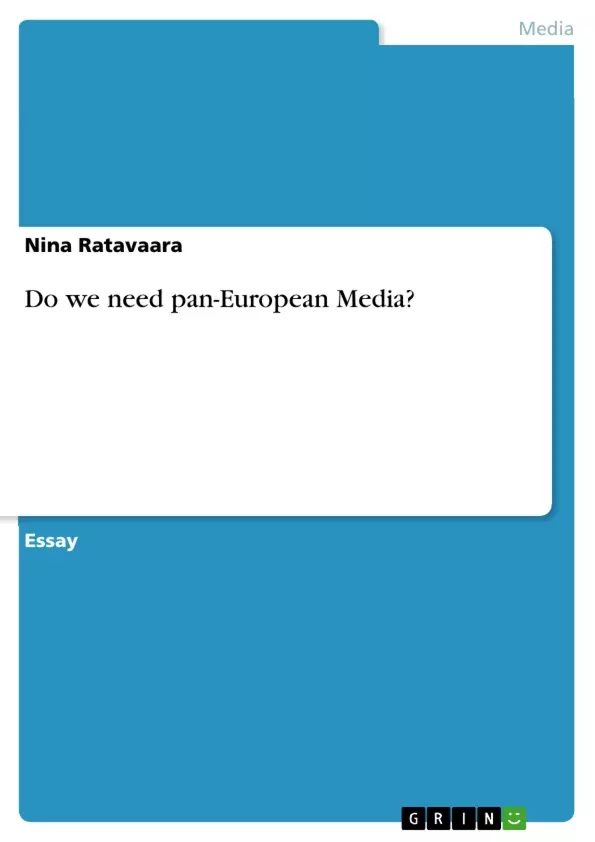Europe can be defined and its countries linked together in several ways and its borders aren’t completely clear. Geography and history join us and with the start of the EU also political and more defined economical reasons. Several areas of Europe share a similar culture. But there are as many (or maybe even more) differences as similarities. E.g. Switzerland is not part of the EU, but part of Europe and inside the country itself there are 4 languages and at least as many cultures. So how could a big area like Europe have something in common if it’s not even possible in a small country like Switzerland? Media is traditionally a strong part of culture: The culture media is produced in defines its characteristics and simultaneously the media influences the culture. Regional or national radio and television seem to be a very important tool to define identity and culture. In the EU the focus lies more on economics than on building a common culture and identity. But for the EU to be accepted and therefore to function a bonding element has to exist. A shared culture and value community must be created (cf. Habermas:2001:4) and pan-European media could play a crucial role in that. It might show people living in a wide, diverse area called “Europe” that this region could be a community that actually exists and is not only machinery publishing policies and dealing with economy. The shared currency, the Euro, could have been and maybe is a step into that direction but not every EU country has the Euro (e.g. Sweden, UK) and not every country in the European area is a member of the EU (e.g. Norway, Switzerland).Commercial media companies already walk the way towards pan-European companies and media. (cf. IBM News) Why would they do it if they wouldn’t see profit in it? So even if former projects like Eurikon (cf. Euronews) have failed in the 1980’ies it seems to be worth to invest in pan-European Media both from an economical and cultural point of view. It is a challenge for national protectionism as well as for cultural and social diversity but building a community has involved the same challenges for ages.
Inhaltsverzeichnis (Table of Contents)
- Do We Need Pan-European Media?
- The Importance of a Shared Culture
- Pan-European Media and the Public Sphere
- Governance of Pan-European Media
Zielsetzung und Themenschwerpunkte (Objectives and Key Themes)
This essay examines the need for pan-European media in the context of the European Union. The author argues that such media could foster a shared European culture and identity, promote a stronger European voice in global affairs, and contribute to a robust public sphere. Key themes explored include:- The role of media in shaping national and European identity
- The importance of a public sphere for democratic societies
- The challenges and opportunities of pan-European media in a diverse continent
- The need for balanced governance of media to ensure both freedom of expression and responsibility
- The potential for pan-European media to enhance Europe's global influence
Zusammenfassung der Kapitel (Chapter Summaries)
- Do We Need Pan-European Media? This introductory section establishes the need for a shared European culture and explores the potential role of pan-European media in achieving this goal. It argues that such media could help define a European identity and create a sense of community among citizens of diverse backgrounds.
- The Importance of a Shared Culture This section delves into the historical and cultural context of Europe, highlighting the challenges and opportunities associated with building a shared identity across a diverse continent. It emphasizes the importance of media in shaping cultural values and promoting a sense of commonality.
- Pan-European Media and the Public Sphere This section examines the role of media in shaping public opinion and facilitating dialogue. It explores how pan-European media could contribute to the creation of a robust European public sphere, a forum where citizens can engage in critical discussions about important societal issues.
- Governance of Pan-European Media This section focuses on the governance challenges and opportunities presented by pan-European media. It discusses different models of media regulation and emphasizes the need for a balanced approach that ensures both freedom of expression and responsible journalism.
Schlüsselwörter (Keywords)
This essay examines the potential of pan-European media to foster a shared European culture, strengthen the European voice in global affairs, and contribute to a vibrant public sphere. Key concepts discussed include: European identity, cultural diversity, public sphere, media regulation, freedom of expression, and co-regulation. The essay highlights the importance of media in shaping national and European identity, fostering civic engagement, and promoting democratic values.Frequently Asked Questions
Why does the EU need pan-European media?
Pan-European media could foster a shared European culture and identity, moving beyond purely economic ties to create a sense of community and a robust public sphere for democratic dialogue.
What is the role of the "public sphere" in Europe?
A European public sphere acts as a forum where citizens from different nations can discuss shared issues, helping to hold EU institutions accountable and legitimizing European policies.
How does media influence national vs. European identity?
Traditionally, national media define regional identity and culture. Pan-European media aim to bridge these differences, showing that Europe is a community with shared values despite its diversity.
What are the challenges of creating a shared European media landscape?
Challenges include linguistic barriers (e.g., Switzerland's 4 languages), national protectionism, and the difficulty of representing a diverse continent without losing local cultural nuances.
Why did past projects like Eurikon fail?
Early projects often struggled with financing, lack of audience interest in "top-down" European content, and the strong dominance of established national broadcasters.
- Quote paper
- Nina Ratavaara (Author), 2009, Do we need pan-European Media?, Munich, GRIN Verlag, https://www.grin.com/document/178930



